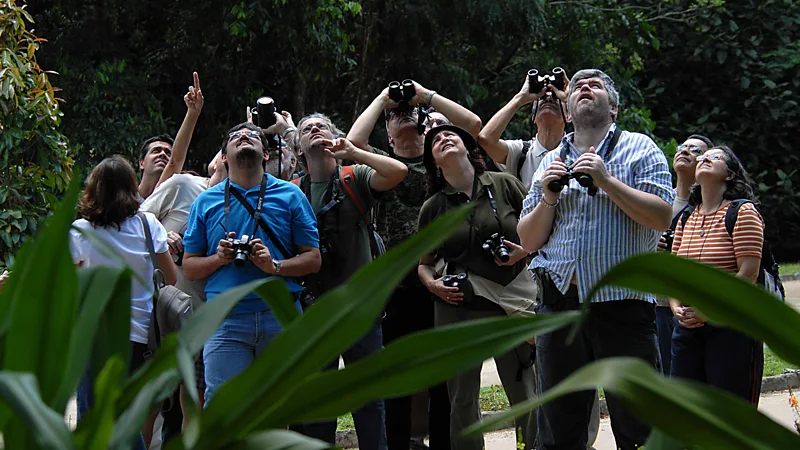Tech
Bat-watching, beach explorations and ‘sniff’ walks: How nature can provide a tonic for loneliness

There is an ever-growing list of the benefits of natural prescriptions – now researchers say nature could offer a cure for loneliness too.
Kye Aziz didn’t consider himself a big nature lover. As an asylum-seeker originally from Indonesia, now based in Melbourne, he’d spent stints of time in the outback and high country. But it wasn’t until a socially-prescribed picnic and gardening excursion that he began to see nature in a new way.
“You feel like you’re transported somewhere else,” says Aziz. “Living in Australia and in Western culture can be very lonely and individualistic – but when we’re sitting outside and having a laugh and feeling that togetherness, it just feels like home.”
There’s a science to that feeling. In the 1980s, in a public health bid to help stressed urban workers heal through nature, the Japanese government invested in a campaign for “shinrinyoku”, or forest bathing. At first, “it was a feeling, not a science” says Qing Li, a medical doctor and clinical professor at Nippon University in Tokyo. But in recent decades, Li and other researchers have linked forest bathing to lower blood pressure, a stabilised nervous system, fewer stress hormones, boosted immune function, and reduced anxiety, depression, anger and fatigue.
According to the late naturalist, Edward Wilson, these health benefits are a product of “biophilia” – an innate love of nature that underpins our near-universal tendency to interact with plants, animals, and other humans.
Tech
Youngest person treated by Nanoknife is cancer-free

A two-year-old boy from north London who was the youngest person to be treated for cancer with Nanoknife technology is now cancer-free.
George, from Camden, was diagnosed with rhabdomyosarcoma (RMS), a type of soft tissue cancer in his liver and bile duct, in the summer of 2023.
“I will never forget that moment,” said his father Jonathan. “It felt like my entire world had collapsed.”
After three rounds of chemotherapy, he was treated using Nanoknife technology at King’s College Hospital, which uses electrical current to destroy areas of cancer.
Latest News
‘Firkle’, ‘Gluschdich’ and more: 10 words we learned in 2024 that will expand your mind

Here are some of our favourite words and phrases that the BBC encountered during in our reporting this year that helped to unravel the changes taking place in world around us.
From words that capture a reindeer’s search for food in the Arctic, to new expressions that convey the nuances of climate change around the world, this year we’ve explored how languages can help our minds travel and take us deep into other cultures. We’ve learned about twins inventing secret languages, and researchers discovering long-lost scripts from ancient trade routes. We picked up an Amish word for subtle food cravings, and heard how Antarctic researchers develop their own slang during their long, dark months of isolation.
There are thousands of languages in the world, and new ones keep being discovered, including lost scripts from the ancient past. But according to the Living Tongues Institute for Endangered Languages, over 3,000 languages are now endangered and at risk of disappearing. Learning, speaking and enjoying them can, however, help to keep them alive for ourselves and future generations. Here are some of the most intriguing expressions we learned from languages around the world during our reporting in 2024. They are listed in alphabetical order – click on each word to read the full story behind it:
Tech
Telegram pushes extremist groups to users – study

The social media platform Telegram uses an algorithm that promotes extremist content, a new study shared exclusively with the BBC has revealed.
The report, from the US civil rights organisation the Southern Poverty Law Center (SPLC), found that the “similar channels” feature introduced last year recommends extremist channels even to users browsing subjects such as celebrities or technology.
A professor also showed BBC Panorama how he found someone within moments on Telegram who offered to ship an Uzi submachine gun to the UK for £850.
Telegram says users are “only presented with content they have chosen to engage with” and it removes millions of pieces of harmful content daily.
-

 Entertainment4 months ago
Entertainment4 months agoEarthquake scientists are learning warning signs of ‘The Big One.’ When should they tell the public?
-

 International4 months ago
International4 months agoTarar accuses Imran Khan of conspiring with Faiz Hameed to destabilise Pakistan
-

 International2 months ago
International2 months agoPTI Announces Not to Boycott New Committees
-

 Business3 months ago
Business3 months agoMajor Corruption Scandal Uncovered at WASA Multan: Rs1.5 Billion Embezzlement Exposed
-

 Business4 months ago
Business4 months agoThe Impact of QR Codes on Traditional Advertising
-

 Business4 months ago
Business4 months agoThe Benefits and Problems of International Trade in the Context of Global Crisis
-

 Business4 months ago
Business4 months agoFraud by Pakistani Firm Sparks Outrage in Business Community; Concerns Rise Over International Investment
-

 Business2 months ago
Business2 months agoHigh Court Blocks MDCAT Merit List Amid Controversy Over Exam Error






